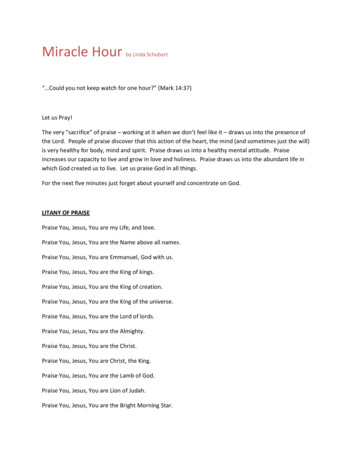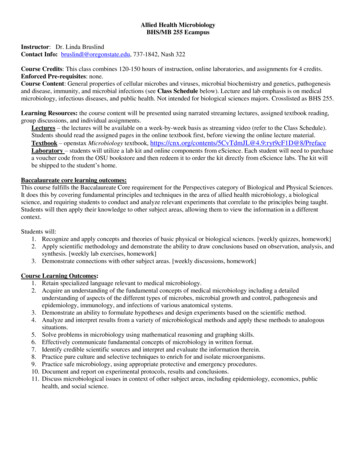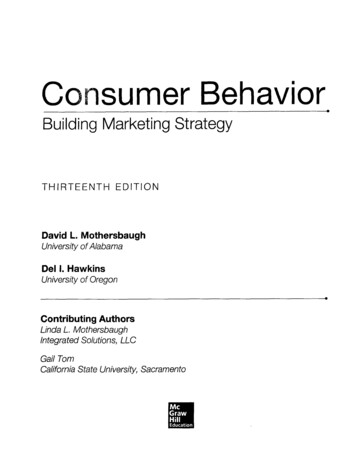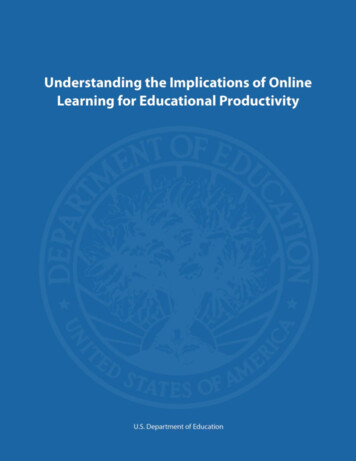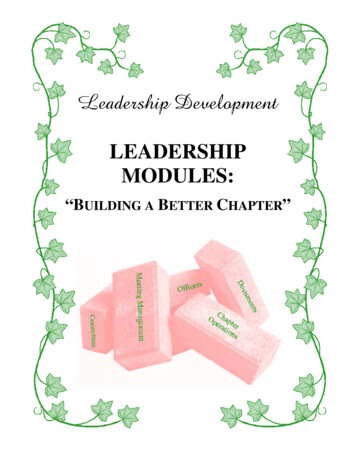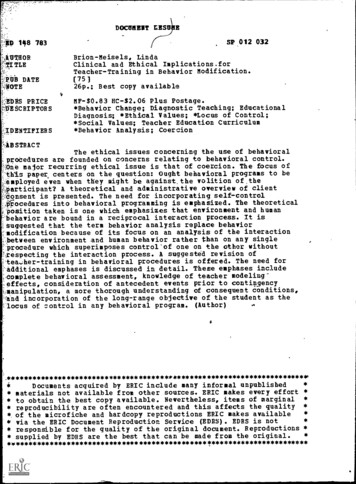
Transcription
DOCONENT LES!' EP 148 7834PTHORrTITLEBB DATENOTE511012 032Brion-Meisels, LindaClinical and Ethical Implications .forTeacher-Training in Behavior Modification.(75]26p.; Best copy available1:DES PRICE'ESCRIPTORSDENTIFIERSMF- 0.83 HC-S2.06 Plus Postage.*Behavior Change; Diagnostic Teaching; EducationalDiagnosis; *Ethical Values; *Locus of Control;*Social Values; Teacher Education Curriculum*Behavior Analysis; CoercionABSTRACTThe ethical issues concerning the use of behavioralprocedures are founded on concerns relating to behavioral control.One major recurring ethical issue is that of coercion. The focus ofthis paper centers on the question: Ought behavioral programs to beemployed even when they might be against, the volition of ,the,'participant? A theoretical and administrative overview of clientconsent is presented. The need for incorporating self-control-procedures into behavioral programming is emphasized. The theoreticalposition taken is one which emphasizes that environment and humanbehavior are bound in a reciprocal interaction process. It issuggested that the term behavior analysis replace behaviormodification because of its focus on an analysis of the interactionbetween environment and human behavior rather than on any single:;procedure which superimposes control'of one on the other without!respecting the interaction process. A suggested revision oftea.her- training in behavioral procedures is offered. The need foradditional emphases is discussed in detail. These emphases includecomplete behavioral assessment, knowledge of teacher modelingeffects, consideration of antecedent events prior to contingencymanipulation, a more thorough understanding of consequent conditions,'land incorporation of the long-range objective of the student as thelocus of control in any behavioral program. *314#*#*###*##***##############VDocuments acquired by ERIC include many informal unpublished* materials not available from other sources. ERIC makes every effort ** to obtain the best copy available. Nevertheless, items of marginal ** reproducibility are often encountered and this affects the quality *** of the microfiche and hardcopy reproductions ERIC makes available* via the ERIC Document Reproduction Service (EDRS). EDRS is not* responsible for the quality of the original document. Reproductions *** supplied by EDRS are the best that can be made from the ******************************
Linda Brion-Meisels, Ph.D.Waller F. Dearborn School34 Concord AvenueCambridge, Massachusetts 02138/Z1,,Clinical and Ethical Implications for Teacher-Trainine- in Behavior"odificationLinda Brion-eis elsLesley Collep-eTITCIP re. --;"'1;i1.40tr'u":'PERMISSION TO REPRODUCE THIS,ERIAL HAS RE-EN (,RANTED BYL"!U 1 DEPARTMENT Or HEALTH4-1EDUCATION IL WELFARENATIONAL INSTITUTE OFEDUCATIONTO THE EDUCATIONAL RESOURCESINFORMATION CENTER IERIL) ANDTHE ERIC SYSTEM CONTRACTORSTHIS DOCUMENT HAS BEEN REPRODUCED EXACTLY AS RECEIVED FROMTHE PERSON OR ORGANIZATION ORiGINATING IT POINTS OF VIEW OR OPINIONSSTATED 00 NOT NECESSARILY REPRESE NT OFF ICIAL NATIONAL INSTITUTE OFEDUCATION POS,TION OR POLICY2i
Ethical. Implications in Teacher-Training2IntroductionSkinner has emphasized the need to employ our understanding201" learning theory to teach students how they learn (Skinner, 1969,During the past few years, hoWever, behavioral conceptsarad"tec,hniques have become a significant part of teacher-trainingfor classroCm' management;it is important to direct the focus ofbehavior modification in schools toward student involvement and self--.mana&tont prokrams.The ethical concern regarding the use ofbehavior modification in institutions has focused primarily on'programs,Which are designed and implemented without client input (Biklen,Note 1.). Public school classrooms need not repeat the patterns ofinstitution4l cars in Which the client is frequently a passive.,Given a basic understanding of learning theory, andparticipant.-.'continued consultant support, teachers have the potential for developingclassrooms which,not only teach. 'specific academic skills but also theA.,broader.skills-of'how to learn.,.How to learn skills are the skills.4.,---,-whiCh-Cn truely "free" an individualto actualize him/herself.1;Increased understanding of how individuals learn, increases both ourown skills At teaching in a classroom and a student's ability to teachhim/herself.Though it would be illusory to offer young children,I,Tn-ccordance with the AFATack Force on the Guidelines for i nsexist,Language (ivIllirlf:Lr1,111m112212ELII, 1975, 30, 682-684) this paper uses'cObined pronoun forms./3,
Ethical Implications in Teacher-Training3equal decision-making power with adults, each child comes to theclassroom with a personal history and an individual set of perceptionsIt is important that considerationof him/herself and his/her world.be given not only to professional perceptions of a classroom sitation;we also need to heed the child's own personal statement, because itis through the child's explanation that we gain an understanding ofthe self-reinforcement.and self-punishment contingencies operating(Meisels, 1974).If we are to teach children how to help themselves,we mustbegin with teaching children skills in accurate self-assessmentand self-monitoring.Over the past ten years, the efficacy of behavioral procedureshas become more and more evident (Franks, 1969, 1973;Krasner, 1965, 1969).Ullmann &Learning theory principles applied to therapyhave proved superior to traditional psychotherapeutic techniques ineffecting behavior change (Eysenck, 1952;1967).Paul, 1966,These principles are now being applied more and more frequentlyin school settings (Hewett, 196911972).Levitt, 1957;Homme,11970;O'Leary & O'Leary,In both clinical and educational settings, ethical issuesconcerning the control of human behavior are more relevant thanever before (Miron, 1968).Ethical issues concerning the use of behavioral procedures arefounded on concerns relating to behavioral control.4Though there is
Ethical Implications in Teacher-Training4one set of clinical issues concerned with. the experimental andempirical validity of such procedures, the social-political issues focuson the concern that these procedures may be used to regulate thebehaviors, feelings, or attitudes of non-consenting individualsorgroups (London, 1969).Bandura (1969) has noted that behavior controldoes not necessarily mean behavior constraint.Though some behavioristshave chosen to emphasize environment as the first cause in humanbehavior (Skinner, 1971), it is also possible to take the positionthat the environment is a function of human behavior.The positionwhich seems most clinically and ethically sound, is one which emphasizesthat environment and human behavior are bound in a reciprocal interactionprocess (Bandura, 1974).Individuals trained in behavioral procedures,then, must be trained with an emphasis on training clients in theseprocedures.While teachers and clinicians alike may employ behavioraltechniques in order to effect behavior change in a student or client,the long range goal of any behavioral program must culminate in learningself-control procedures.This goal most successfully respects theinteraction between environment and human behavior, and the ethicaloissueconcerned with maintaining a balance between these two factors.One major recurring ethical concern is that of coercion.(1975) has defined three issues which deal with coerciont(1)KazdinIs
Ethical Implications in Teacher-Training5planned modification of other people's behavior as an ethically(2)activity,justifiable?behavioral change?what specific means are employed forand (3)ought behavioral programs to be employedeven when they might be against the volition of the participant?Inthis paper only the third point will be fully discussed.The objection to behavior modification as a legitimate, ethicalendeavor can be answered on one level by the large and growing amountof literature verifying the basic principles of experimental psychology. andlearning theory.The moral question is not whether or not behaviormodification should be used.Rather, the real issues concern whowill control, by what means, and towards what goals (Bandura, 1969,p. 85;Krasner, 1962;Skinner, 1971).There have been two separate issues which pertain to the meansOne issue is the bribery objection.employed in behavior modification.The distinction between bribery and reinforcement is based on thediscrimination of rewards 'for immoral or corrupt behavior, and rewardsfor adaptive social and/or academic skills taught in behavioralintervention programs (O'Leary; Poulos, & Devine, 1972).The othermajor criticism of behavioral procedures is concerned with the useof aversive techniques.Though behaviorists have given rationale forthe use of such techniques in specific cases (Bandura, 1969, p. 87),there is much concern from within the profession regarding the use6
Ethical Implications in Teacher-Training6of aversion in treatment;ethical guidelines are in the process. ofbeing developed (Schwitzgebel, 1974;3).Cautela, Note 2;Sarndperil, NoteFortunately, the public school system is one institution whichalready has legal safeguards in this area.Of primary concern with young students is the third aspect ofcoercion:client consent.A commitment to greater student involvementworkingin the development of treatment plans means that those of uswith young children must focus on the cognitive and social skillsnecessary to enable a child to be an active participant in his/herown educational plan.In order to pursue the goal of self-actualizationfor each student, we must make a commitment to teaching the skillsnecessary for the child to be successfully involved in decisionmaking processes.It is important that teachers employing behavioraltechniques understand both:(1)how these procedures relatetheoretically to learning theory, and (2)what variables, in both thechild's external environment (Skinner, 1968) as well asenvironment (Bandura,-19741- Cautela, 1968;internalWolpe, 1968) must beco side red before a clinically sound treatment plan can be implemented.Behavior modification as a set of clinical procedures isrelatively new (Franks, 1969;London, 1974).Concerns have beenexpressed regarding the need to establish not only ethical guidelines,7
Ethical Implications in Teacher-Training7but also certification standards for the p4actice of behavioral'procedures with other individuals ("Individual Rights and the FederalRole in Behavior Modification," 1974;1975).Stuart, Cautela, Stolz, & Azrin,There is an educastional as well as an ethical need for ongoingteacher-training and available consultation in behavior therapy.Different levels of certification are viewed as desirable by this authorbecause they would facilitate means by which to hold individualsaccountable.Teachers can, and do, successfully employ a variety ofbehavioral procedures in the classroom.However, trained behavioralconsultants are lacking in many schools which employ behavioral programs.Such a support service is a reasonable clinical and ethical demand ofteachers who realistically cannot be trained on an expert level in allclinical and educational fields used by a public school teacher.A basic understanding of operant conditioning (rewards andpunishments) is offered today in most programs which train teachers.Perhaps, because learning theory has traditionally been studied indepartments of psychology rather than education, schools of education.by-in-large are not up to date with recent developments in the fieldof behaviorism.Teacher-training in this area, both at the universitylevel and in school systems, has, to date, focused primarily on themanipulation of consequences in order to achieve teacher-desired
Ethical Implications in Teacher-Training8behavioral change.The primary purpose of this paper is to emphasizethose variables which affect learning but are not adequately consideredin teacher-training programs,Consequently, these variables areoften forgotten while assessing a student's problem anted developinga treatment plan.To safeguard against coercion, to protect the student,and/or parent's rights to consent ("Guidelines.," 1969) andinvolvement in an educational plan, and to broaden teachers' behavioralunderstanding of maladaptive behavior, it is essential to deal withthe following issues in teacher-training instruction.Teacher-Training in Behavior Analvsis,Behavior modification is, perhaps, a poor choice of names forthe set 'of learning principles and procedures covered by this term'(Davison & Stuart, 1975).Many varied medical and psychologicalprocedure are designed to modify behavior, as, for example, drugs,psychotherapy, as well as conditioning procedures.Behavior modificationas a psychological term, however, generally refers only to0the use of experimentally established principles oflearning for the purpose of changifig unadaptive behavior.Unadaptive habits are weakened and eliminated;adaptivehabits are initiated and strengthened" (Wolpe, 1969, p. vii).The term behavior analysis (Binder, Note 4) might be a more appropriatelabel for the procedures used by behaviorists because of its focus onan analysis of the interaction between environment ana human behaviorrather than on any single procedure which superimposes Control of one
Ethical Implications in Teacher-Training9on the other without respecting the interaction process.The goalof behavioral procedures is, after all, to teach participants how toanalyze their own behavior and its interaction with their environment.Though.in some ways it seems. silly to argue over terms, it isimportant to correct the unfortunate connotation that "behaviormodification" cf behavior infers one human being controlling another.A behavioral' explanation of learning includes three major variables:the behavior itself, the antecedent event that elicits the behavior,and the consequences which follow the behavior and influence theprobability of its occurrence.Learning theory principles deal withenvironmental arrangements that increase or decrease the likelihoodthat various behaviors will be learned and performed (Rimm & Masters,1974).If classroom children are cooperative and active,"their pastand current environmental experiences encourage such behavior.It isassumed that if classroom children are obstinate or disruptive, theirpast and current environmental experiences serve to encourage thatbehavior.40In addition to antecedents and consequences directly affectingbehavior of the child, the classroom environment also offers models whichenhance the probability of observational learning (Bandura, 1969).In observational learning the child learns by observing the effects ofvarious antecedent and consequent conditions on someone else.To summarize, then, teachers influence the behavior of studentsby the choice of curricula, the modeling behavior, the classroom rules010
Ethical Implications in Teacher-Training10which are established, as well as the shaping of specific classroombehaviors on the part of both individual students and the grOup.The Need for a Complete Behavioral AssessmentTeachers are familidr with the premises underlying individualizationof academic curricula (Yager, 1962)., The same set of notions underlieprograms in teaching new social skills.it academic or social,mus6eginAny educational program, beat the individual child's current\level of functioning., Ther fore, before any decision can be maderegarding the implementation of behavioral procedures, one must firstdetermine those deficit and surfeit behaviors exhibited by the child,as well ds the child's strengths on which a program can te,founded.Cautela (1968) emphasizes the need for a complete behavioral assessmentwhich determines both the child's behavioral repertoire and theenvironmental antecedent and consequent conditions that serve toelicit and maintain behavior.Failure to complete a behavioral analysisoften results in an inadequate behavioralprogram;incorrectassumptions about the child's existing behavioral repertoire andmotivational functioning may also result in programs, which someresearch has round, detrimental to learning ;Feingold & Mahoney, 1975;Tepper, Greene, & Nisbett, 1973'.Levine & Fasnacht, 1974).The behavioral assessment includes an operational, measurabledefinition cf the maladaptive behavior (Buckley & Walker, 1970).Abstract labels of such internal states as unmotivated, low self-stepm,
SEthical Implications in Teadher-Training11poor self-imaae,are often used as explahations for behavior whenactually they are merely descriptions of a set of behaviors *Joh needto be concretely defined.Traditionally, behaviorists have dealt onlywith observable, measurable behavior, termed overt be)' vior; however,in the past decade, behaviorists have begun to attempt to operationalizeand measure covert behavior.Covert behaviors include thoughts,feelings, and images (Thoresen & Mahoney, 1974, p. 110).Sloane (Note 5)image in children.makes the point well in a discussion on selfFrom experience, he finds that most children whoare labeled as having a poor self-image have endured constant failurein their environment.They do poorly in school, have few positiverelationships, lack both social and activity skills that would resultin positive social reinforceMent from others.Covert behaviors which41.might be operative in the example offered by Sloane include negativeself-statements, images of past failt4s, and anxiety.A child whoistold by his environment that he is bad respondS with good reality.testing when he then describes himself in a similar manner:he isnot "neurotic;" he has simply bought the label,applied-by others.The issue, as Sloane points out, is how to begin correcting thissituation -- by trying to get inside the child to correct the stateof his self-imap:e or by chancing the environmental experiences to offer
Ethical Implications in Teacher-Training12the child positive rather than negative feedback.Adopting this latterpoint of view as one offering the best opportunity for successfulbehavior change, the first step in employing behavior analysis in theclassroom is a nonjudgemental, quantitative description of covert aswell as overt behavior.Atehavioral assessment should be initiated prior to the beginningof any behavioral program and continued throughout the treatment andFailure to engage in a thorough ongoingfollow-up of the program.assessment may be due to-several factors.School systems do not usuallyprovide assessment forms foAsocial behavior -- the way academic assec,smenmaterials are provided.While many schools have psychologists anddiagnostic teachers available for academic testing, there are most oftenno trained individuals available to aid the teacher in consultation ormerely in the man-power needed for the observational data necessaryfor a behavioral assessment.Due to the orientation of most schoolsof education, the mere task of operationalizing a classroom socialsituation is difficult for teachers,In addition, ever if one hasthe skills of assessment, the process entails a lot of time and energy.The final benetits of completing a thorough assessment of asituation, aside from the ethical safeguards, are overwhelmingly infavor of such a procedure.It is, however, unfortunately much easierto make this point while sitting together and exchanging classroom13
Ethical Implications in Teacher-Training13experiences than in a journal article.It is only possible here tomake a plea that teacher-training institutions increase their emphasison the development of teacher-skills in behavioral assessment anddevelop, through discussion of clinical and ethical issues involved,a firm commitment to use these procedures.The Teacher as a " orielMuch research has now shown that children do learn throughobservation of others (Bandura, 1969).It is important as a teacherlearns the skills of behavioral assessment and procedural implementation,that s/he have an accurate perception of his or her own behavior in theclassroom.Social reinforcement by adults does, under certain conditionsserve to increase'a child's tendency to imitate the adult (Baer &Sherman, 1964;Bandura & Huston, 1961).The better a teacher is ableto exhibit consideration 'of others, cooperation, active learning, andself-control -- the more likely it is that students will also exhibitthese behaviors.Those characteristics of both the model and theobserver which enhance observational learning or imitation have beenreviewed by Bandura (1969).In general, however, the teacher usually#appears to be an influential model in early elementary school sinceadults are the main social reinforcer for most young children.repeated long-term failings of "Do as I say;the strength of modeling on learning.14not as I do,"Theindicate
Ethical Implications in Teacher-Training14The issue of modeling is an important one for teachers to considerthroughout a discussion on any particular set of psychological oreducational procedures.Ia addition to whatever is learned due to theprocedures being employed, the child may also learn to model the adult,There are, for example, psychodynamic explanations and procedures forencouraging "acting-out" behavior in some withdrawn children;however,if the adult must, in the process, restrain a child, we then must dealwith the physically anressive behavior modeled.If a teacher putshis/her class on a token economy designed by the teacher, then in additioto increased motivation to complete tasks, we must also deal with themodeled authoritarianism.When one considers the observational learning, which takes placein children in a classroom, it becomes even more important that wedirect all programs towards the goal of self-control skills.Maslow's(1968) model of self-actualization is understandably popular inhumanistic psychology and education because of its emphasis on intrinsiccontrols.The difficulty with the concept of self-actualization forthis author, however, is the lack of operationalized direction.Behavioral procedures offer a clear, concise set of skills by which onecan increase learning of any particular task.In addition, if those ofus who employ behavioral procedures in the classroom wish to teachself-actualization, we must program our classrooms to move from teachercontrol to student control.15
Ethical Implications in Teacher-Training15The Role of the Teacher in Deterrining Appropriate Antecedent ConditionsOne of the greatest ethical problems with behavior analysis inteacher-training is that it traditionally dealt only with the behaviorof the child and the teacher-determined consequences.To be sure,consequences can be arranged in order to increase specific studybehaviors, e.g., task orientation in the classroom.Very frequently,however, children do not carry out the academic tasks because thechoice of curricula (antecedent event) fails to involve or interestthem.Classroom behavior problems often begin with a poor fit betweena child's skills and the task (Taft, Note 6).There must be a diagnosisof the student's academic strengths and weaknesses before antecedentconditions can be evaluated.An understanding of task., analysis(Junkala, 1973) is necessary in order that a teacher insure an appropriattask for any specific child.For example, let us take a child whomisbehaves during group lessons.Frequently, without the informationgainedcrorn a complete behavioral 'analysis, teachers attribute behaviorto what are assumed to be implicit emotional reactions.Our hypotheticalchild's teacher assumes that the student is misbehaving because he ;sn'tmotivated to learn and the teacher decides to employ a token economyprogram to increase the child's attending behavior.A thoroughassessment of this child's learning style, however, results in thy'
Ethical Implications in Teacher-Training16diagnosis of an auditory prOblem.Children with auditory diffiCultiesmist receive curricula which are designed to offer visual input tocompensate for their difficulty in processing the spoken word.Theuse of a contingency program to increase attending behavior must beconsidered coercive in this instance since it can only teach the child]to sit still and obey orders.The presentation of the lesson would haveto be modified in order for the child to attend.A teacher who isinterested in modifying the academic behavior of a student should firsattempt to find appropriate curricula which will elicit the desiredbehaviof rather than focus on the undesirable, competing responsesbeing exhibited:This serves both the student and the teacher.In addition to understanding antecedent academic events, it isimportant to consider antecedent conditions which influence socialTeacher-training in behaviorbehavior.analysismust increase itsconsideration of the variables of overt environmental conditions aswell as-covert conditions, e.g., self-statements, anxiety, and anger.Wahler and Cormier (1970) present a useful model for teachers in.determining those environmental antecedent conditions which serve to,.elicit, specific behaviors in question when working with children.The Role of the Teacher in Determining Consecuences and Establishinq,ContingenciesMost teacher-training in behavior analysis has focused on thoseoperant coAditioning techniques which modify behavior by, manipulation'7
Ethical Implications in Teacher-Training17r.tsf environmental consequences (Skinner, 1968).Despite the need formore attention to antecedent variables, classroom teachers have-Concentrated on developing academic and social programs based onenvironmental consequences and their powerful effect on whichare learned and/or performed;behaviorsExposure to behavioral procedures hase.greatlybroadened educators' understanding of social learning theory.Teachers' reactions are strong determinants of the type of studentbehavior exhibited in the classroom.Similarly, the reactions ofstudents greatly shape teachers' responses (Smith & Smith, 1970).We can be taught to shbut, to punish, or to reinforce positively.Many teachers inadvertently control negatively by withdrawal bf threator termination of shbuting as soon as students follow directions.Asthis pattern is repeated, students in a classroom soon learn to cooperateas soon as the aversive conditions are presented.This type of techniqueis coercive in that it is, in some sense, punitive for the students:more important, there is, no positively basecooperation between theteacher and the students regarding the educational experience.The'students are participating only tc avoid andesirable consequences ratherthan becuase they experience reinforcement, and are supportive of theactivity.At the same time, the teacher is being coerced intor.threatening or shouting because each time the students cooperate inthat situation, the reacher is negatively reinforced for using that18
Ethical Implications in Teacher-Training18procedure.A greater understanding and skill in behavioral assessmentwill increase successful use of the basic principles of reward andpunishment in the classroom.Presently, behavioral programs in schools fail both clinicallyand ethically because of the lack of attention to what has become aclinical truism in behavior therapy:the elimination of malada,tivebehavior should in most cases be accompanied by the formation of newbehavior if there is to be permanent positive change.It is vital thatteachers trained in behavior analysis procedures learn to combine4procedures in a manner which takes the whole child into account.Inorder for management ofsmalaaaptive behavior. to be successful, new,appropriate behaviors must be taught to replace undesirable behavior.The term behavior modification has been incorrectly used for manysituations which are merely punitive and restrictive, such as prolongedisolation.Those procedures, based on learning theory, which can beappropriately labeled behavior modification or behavior analysis doemphasize, instead, a positive, expansive setting in which a childlearns how to more successfully fulfill' his or her individual needs/1.(Meisels, 1974).Reinforcement theory emphasizes the need,to re-programa child's social system rather than the child. (Patterson, 1969):is a heeded clinical as well as ethical emphasis.19this
Ethical Implications in Teacher-Training19A Necessary Ethical Commitment:The Student as the Locus of ControlThe implicit, if not explicit, goal of all psychological andeducational procedures is to a.the child in gaining skills so that s/hecan more successfully control his/her environment and influence his/her owlactions (Thoresen & Mahoney, 1974).Bartdura (1969, p. 239) emphasizesthe value in self-regulatory mechanisms when he states that the highestlevel of autonomy is behavior generated by self-evaluative and otherself-reinforcing consequences.There is some experimental evidencewhich supports the notion that individuals who perceive themselves asthe locUS, of control for their own-behavior maintain newly-acquiredskills better than those individuals who perceive the locus of controleither as in their environment or as a function of chance(Rotter &Mulry, 1965;Secord & Backman, 1964).This area"of behavioral self-c-ontrol is relatively new, andteacher-training, in particular, needs more emphasis on employingbehavioral techniques to increase self-control behavior's.Cautela (1969')offers an important overview of the advantages and disadvantages ofteaching self-control.Perhaps the strongest objection to behavioranalysis in schools has come from our failure to put the locus of controlback on the student.Behavior analysis is a set of procedures designed to enhancelearning.Ultimately, as in any learning situation, the controls shouldbg, internalized by the learner ('-,:Ginnies & Ferster, 1971, p. 107).20
Ethical Implications in Teadher-Training20It is with those that place total emphasis on m
understanding of maladaptive behavior, it is essential to deal with the following issues in teacher-training instruction. Teacher-Training in Behavior Analvsis, Behavior modification is, perhaps, a poor choice of names for the set 'of learning principles and procedures covered by this term '

